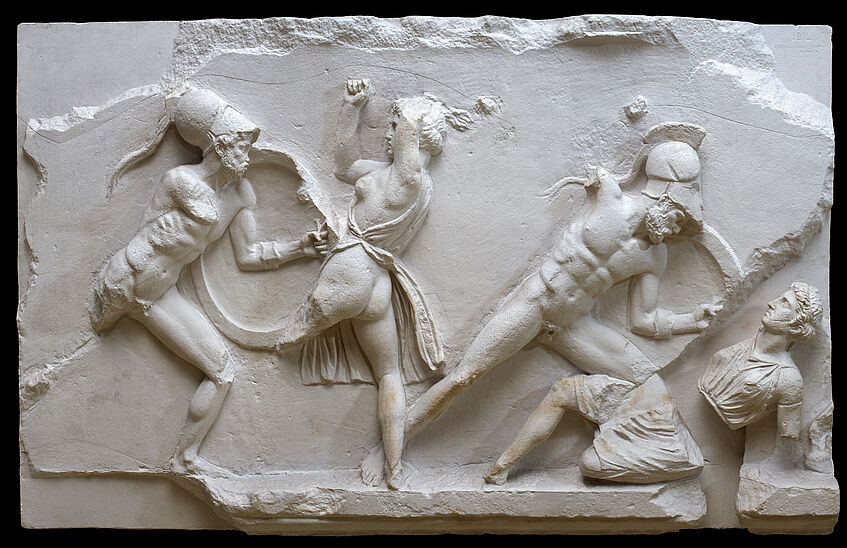Tour C: Dress, Nudity and Nakedness in Antiquity
What are the politics of getting dressed, undressed, and naked? What does it mean to be nude? The answer depends on who you are, and the situation that you are in.
C5 De-sexualised female nudity

[IKA, Photo: Kristina Klein]
Inv.-Nr. 832d
Friesplatte vom sog. Maussolleion mit der Darstellung einer Amazonomachie
London, British Museum 1857,1220.269
um 350 v. Chr.
In the ancient Greco-Roman world as today, depictions of female nudity are often sexualised (see the Crouching Aphrodite upstairs for an example, also part of this tour). This is one instance where the opposite is true – female nudity is here completely desexualised.
This cast represents part of a sculpted frieze from the Mausoleum at Halikarnassos, on which is depicted a battle between male warriors and Amazons. While the male warriors are mostly nude, the Amazons are scantily dressed, their light clothing often slipping off their bodies entirely, revealing their breasts and buttocks. Yet the naked female bodies on display are not designed to excite sexual arousal. They are the strong, muscular bodies of warriors in action – warriors who simply happen to be female.
Amazons hold a peculiar place in the Greek imagination, and therefore also in Greek art. The strangeness of warrior women implied a society that was entirely opposite to that of the Greeks, and Amazons were often used to embody the ultimate Other. As a result, they appear frequently in the architectural sculpture of temples, their battles with male warriors representing the struggle between civilization and chaos. Another example of this kind of scene, known as an Amazonomachy, can be found on the wall opposite, from the Temple of Apollo at Bassae.
Yet the Mausoleum at Halikarnassos in the southwest of modern-day Turkey was not a Greek temple. It was the funerary monument of a dynast called Mausolus. While Mausolus embraced many Greek cultural forms, especially when it came to monumental architecture, he also expressed his identity as a Carian – an indigenous people from western Anatolia whose lands neighboured those of the Greek cities on the coast. The meaning of the Amazons in this context is more complex. Several Anatolian cities claimed to have been founded by Amazons in the legendary pre-Greek past, and this heroic depiction of Amazons on the Mausoleum at Halikarnassos indicates that for the Carians, Amazons were not simply metaphors for chaos and barbarity.
